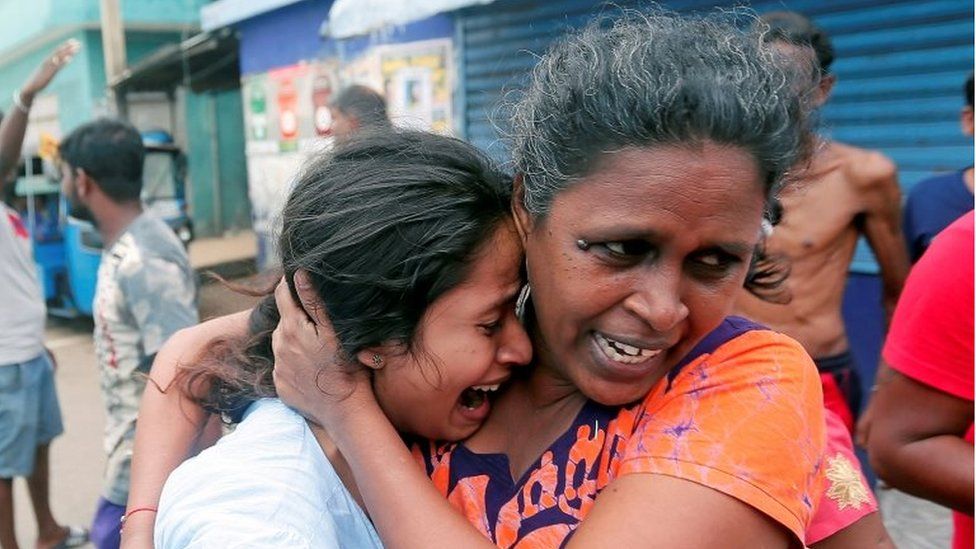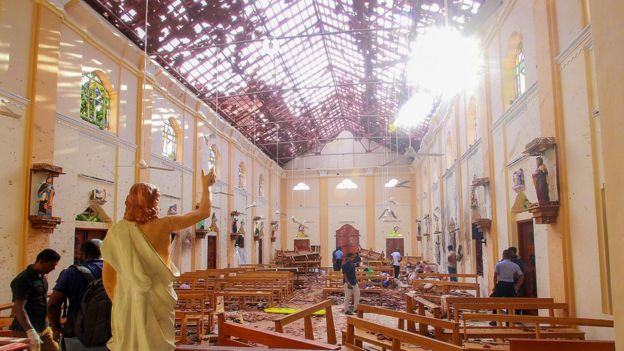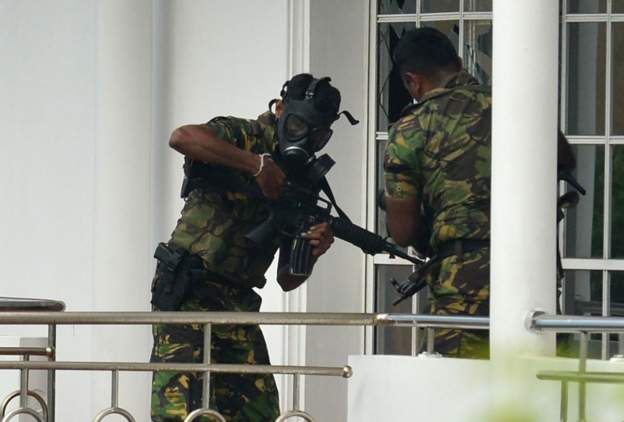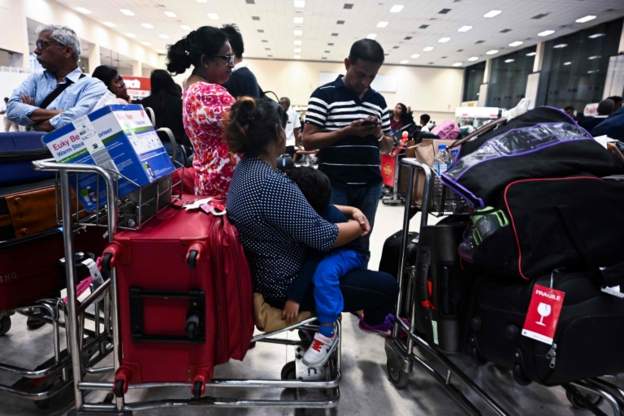Sri Lanka attacks: What we know about the Easter bombings
- Published

On Easter Sunday, suicide bombers killed at least 253 people and injured some 500 at churches and top-end hotels across Sri Lanka.
Most victims were Sri Lankans, but at least 38 foreigners are among the dead, including British, Indian and US citizens.
The official death toll had reached 359 by Thursday. However, the Sri Lankan government then revised the figure down, blaming a calculation error.
Evidence is mounting that local jihadists linked to the Islamic State (IS) group carried out the attack, and police have made a number of arrests.
What happened?
The first reports were at about 08:45 (03:15 GMT) on Sunday 21 April. Six blasts took place within a short space of time.
Three were at churches - in the Kochchikade district of the capital, Colombo; in Negombo, to the north; and in the eastern city of Batticaloa. The other three blasts rocked the Shangri-La, Kingsbury and Cinnamon Grand hotels in Colombo.
Two further explosions were reported later as police searched for suspects - one in Dehiwala in southern Colombo, and another one near the Colombo district of Dematagoda, during a police raid.
Late on Sunday, an improvised explosive device was found and disposed of close to the country's main airport, near Colombo.
And on Monday another blast rocked a street near a church in the capital. Police were attempting to defuse explosives in a vehicle used by the attackers when it blew up.
According to police sources, an attack on a fourth hotel failed and helped lead police to the Islamist group now blamed for the assault.
On Friday, relatives of the bombers' suspected mastermind, Islamist preacher Zahran Hashim, were among 15 people killed when police raided a house in the eastern town of Sainthamaruthu.
Who are the victims?
Hundreds of Sri Lankan families are in mourning. One of the first victims to be indentified was celebrity chef Shantha Mayadunne. Other Sri Lankans killed included members of church congregations and staff at the hotels targeted.
The confirmed international casualties are from the UK, Denmark, Portugal, India, Turkey, Australia, the Netherlands, Japan, Switzerland, Spain, Bangladesh, the US and China.
Among the dead are three children of Danish billionaire Anders Holch Povlsen, owner of the Bestseller clothing chain and the largest shareholder in clothing giant Asos.
Who were the attackers?
On Monday Sri Lankan authorities said they believed a little-known local militant Islamist group known as National Thowheed Jamath (NTJ) was to blame.
On Tuesday, IS said it had carried out the attacks, and released video of men it says were the bombers, pledging allegiance to the group.
All but one of the men can be seen with their faces covered. Some are holding knives. The man with his face uncovered has been named as Hashim, who went on to blow himself up at a hotel in Colombo.
IS said "members of the US-led coalition and Christians in Sri Lanka" had been targeted.
BBC security correspondent Gordon Corera says that while IS in the past has claimed attacks it was not involved in, this statement is being taken seriously due to the scale of the attacks.
The choice of targets is more in line with IS ideology than with traditional types of communal violence seen in Sri Lanka, he adds.
According to the Sri Lankan government, most of the attackers were "well educated" and had come from "middle- or upper middle-class" families.
Two were sons of a wealthy spice trader, Mohamed Ibrahim, who was arrested after the attacks.
How has the government responded?
The NTJ was banned on Saturday and dozens of arrests have been made since the attacks. A curfew was also imposed.
The government admitted a "major intelligence lapse" after it was revealed that an Indian intelligence warning from the beginning of the month about planned attacks was not properly shared by the authorities.
Security services had been monitoring the NTJ, but the prime minister and the cabinet were not warned, ministers said.
President Maithripala Sirisena moved to sack the defence secretary and inspector general of police.
What is the country's religious make-up?
Sunday's attacks were the worst ever against Sri Lanka's small Christian minority, who make up just 7% of the 21 million population.
Theravada Buddhism is Sri Lanka's biggest religion, accounting for about 70% of the population. Hindus and Muslims make up around 12% and 10% of the population respectively.
The attacks are Sri Lanka's deadliest act of violence since the end of the 26-year civil war in 2009.
The war is thought to have killed between 70,000 and 80,000 people and ended with the defeat of the Tamil Tigers, who had fought for independence for the Tamil minority.
- Published28 April 2019
- Published26 April 2019
- Published28 April 2019
- Published22 April 2019
- Published22 April 2019
- Published22 April 2019
- Published21 April 2019


